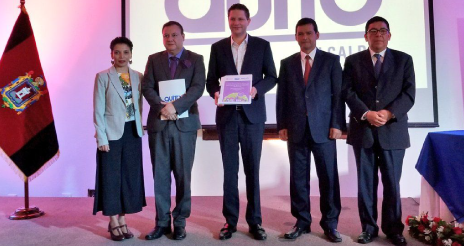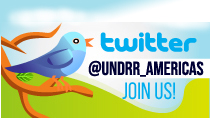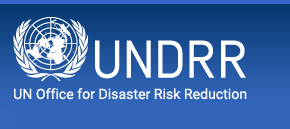- Our Mandate
- Mission and Objectives
- UNDRR in the UN
- Work Programme & Annual Reports
- Results Based System
- Work Partnerships
- Headquarters - Geneva
- SG-UN representatives for DRR
- Regional Office – The Americas and the Caribbean
- Head of the Regional Office – The Americas and the Caribbean
- What is Disaster Risk Reduction?
- What is the International Strategy?
- History of UNDRR
Quito celebrates the launch of the Metropolitan Disaster Risk Reduction Management Plans
 Clockwise: Johanna Granados, UNDRR; Juan Zapata, Secretary general of Security and Governance of Quito; Mauricio Rodas, Mayor of Quito; Raúl Salazar Chief de UNDRR – The Americas, and, Marco Antonio Rodríguez, UNDRR. Picture of DMQ
Clockwise: Johanna Granados, UNDRR; Juan Zapata, Secretary general of Security and Governance of Quito; Mauricio Rodas, Mayor of Quito; Raúl Salazar Chief de UNDRR – The Americas, and, Marco Antonio Rodríguez, UNDRR. Picture of DMQ
By: UNDRR - The Americas
QUITO, Ecuador, October 18, 2017 - The International Meeting 'Quito: One year after Habitat III' hosted the launch of the Metropolitan Disaster Risk Reduction Management Plan of Quito, called 'Quito Listo' ['Quito is Ready'] prepared by the General Secretariat for Security and Governance of Quito with the support of the United Nations Office for Disaster Risk Reduction (UNDRR).
Located at the crossroads of multiple natural and anthropogenic hazards, the exposure and vulnerability of the Metropolitan District of Quito (DMQ) it is imperative that municipal management focuses its efforts on disaster risk reduction through the implementation of structural and non-structural strategies.
The Plan, whose goal is aligned with the Sendai Framework for Disaster Risk Reduction 2015-2030, responds to the needs of the metropolitan municipality of Quito through the formulation of projects focuses on five areas: Quito understanding risk, A strengthened Quito implements the Plan, Quito reduces vulnerability, Quito protects infrastructure and Quito is prepared for emergencies.
The International Meeting intends to highlight Quito's efforts to localize and implement the Sustainable Development Goals (SDGs) and the New Urban Agenda (NUA) adopted during the Habitat III Conference with the Declaration of Quito. This forum shared the Metropolitan Disaster Risk Reduction Management Plan, 'Quito is Ready' on its first day, however, throughout the duration of the forum, tools such as the global campaign 'Making Cities Resilient: My City is Getting Ready!' which have been updated to meet the Sendai Framework for Disaster Risk Reduction were also shared.
The 'Making Cities Resilient' campaign, addresses issues of local governance and urban risk with the aim of supporting local governments in disaster risk reduction and building resilience through the implementation of a set of tools aligned with the Sendai Framework for Disaster Risk Reduction 2015-2030.
The Chief of the United Nations Office for Disaster Risk Reduction (UNDRR) - the Regional Office for the Americas, Mr. Raul Salazar, stressed the importance of the 'Quito is Ready' Plan as the result of a reflection process led by the General Secretariat for Security and Governance of Quito. He emphasized that the Plan promotes not only the achievement of the strategic objectives and guidelines set forth in the Metropolitan Plan of Development and Territorial Planning (PMDOT), but also mainstreams resilience building into the vision of development expected by 2025, thus promoting the achievement of the SDGs.
The International Meeting 'Quito: One year after Habitat III' will also welcome the launch of the Quito Resilience Strategy under the 100 Resilient Cities initiative pioneered by the Rockefeller Foundation, aimed at strengthening in the face of future social, economic, environmental and risk challenges. The Strategy is a milestone in the work carried out by the city of Quito in compliance with the New Urban Agenda and the localization of the SDGs.
The Metropolitan District of Quito is one of the municipalities that has benefited from the 'Making Cities Resilient' initiative. This UNDRR/UN-Habitat joint initiative funded by the European Commission seeks to enhance understanding and capacities to address disaster risk at the local level, support disaster risk reduction at the national level and promote the development of climate change adaptation strategies.
Five other cities in the region are also part of this initiative and have already started drafting the Local Disaster Risk Reduction Action Plans: Guatemala City in Guatemala, Guayaquil in Ecuador, Tegucigalpa in Honduras, Santo Domingo East in the Dominican Republic, and San Juan de Lurigancho in Peru.
Related Links:
General Secretariat for Security and Governance of Quito
Sendai Framework for Disaster Risk Reduction
Global Campaign 'Making Cities Resilient: My city is getting ready!'
Follow the UNDRR news online :
 Now we have twitter account @UNDRR Américas y el Caribe
Now we have twitter account @UNDRR Américas y el Caribe
JOIN US!
Tweets por el @UNDRR Américas y el Caribe
